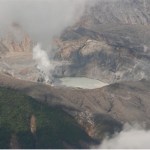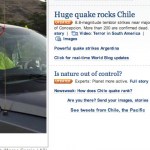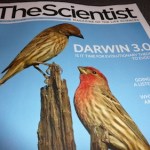Science Journalism
The steam-and-ash plume from Eyjafjallajokull in Iceland, March 22, 2010.
Overnight, the Eyjafjallajokull eruption in Iceland added to its oeuvre, producing what is being reported to be a 8-km plume. Images of the plume (above) suggest (to me) that it is very water-rich, so likely this is the expanding(?) fissure interacting with snow, ice or groundwater, producing steam explosions. These explosions have some minor ash component to them, mostly from the shattering of rapidly cooled lava, but are dominated by steam.
The eruption appears to be continuing into its third day unabated. Flights…
Cleaning up some news ... busy week leading up to a field trip I am helping co-lead to Death Valley next week.
Ubehebe Crater in Death Valley, California
First off, I want to say how amazed I am at the great discussion that went on all weekend about the signs of potential activity in Iceland. It now appears that the earthquakes at Eyjafjallajökull may be waning, however the levels of seismicity have definitely bounced up and down over the last few days. However, the level and depth of the conversation is a testament to all volcanophiles out there. Nice job, folks.
For those of you into…
As many Eruptions readers read, the headlines produced by MSNBC for their coverage of the recent Chilean earthquake raised my ire. To me, it represented the sensationalism of the events - but as with all things media-related, there is a lot of opinions on the matter.
We were lucky to have Alan Boyle, science editor for MSNBC.com, comment on the fray and he has very kindly offered to take your questions about the coverage of science in the mainstream media. This is a unique opportunity for us to discuss how science is portrayed, the rationale for headlines and generally find out about how the…
Some news for a busy Tuesday:
The crater at Poas volcano in Costa Rica, taken February 25, 2010. Image courtesy of OVSICORI by Federico Chavarria.
After the MSNBC debacle, it is nice to see some good articles on why the Chilean earthquake was overall less disastrous than the Haitian earthquake, why the tsunami wasn't as large as predicted and why these earthquakes are not abnormal. There are a lot of factors involved - the location, depth, preparedness, wealth - so the comparison can be very telling in terms of both geologic and societal issues.
The other scientific fallout from the Chilean…
Screen capture of the MSNBC website on February 27, 2010 at ~5:30 PM eastern time.
Most of you have probably already heard about the magnitude 8.8 earthquake that struck today off the coast of Chile. This becomes one of the most powerful earthquakes on record and so far, the death toll has been relatively low - in the hundreds - especially compared to the horrific disaster of the Haiti earthquake from earlier this year. My thoughts go out to all in Chile recovering from the earthquake.
However, I am a little appalled at some of the coverage I've seen for this earthquake. MSNBC has become the…
Well, not quite. I got an intriguing abstract in my inbox earlier today, to this new paper from BMC Neuroscience:
Here using a new conditioned suppression paradigm, we investigated whether the ability of a foot-shockpaired conditioned stimulus to suppress chocolate-seeking behavior was antagonized by previous exposure to a chronic stressful experience, thus modeling aberrant chocolate seeking in sated mice. Our findings demonstrate that while Control (non-food deprived) animals showed a profound conditioned suppression of chocolate seeking during presentation of conditioned stimulus,…
A reminder for readers in Boston and Cambridge: Thursday this week I will be a panelist on a discussion about climate change and the media at the Kennedy School of Government. Details are below and at this link. Audio of the panel discussion will be archived online and I will post a link when available.
The big draw, of course, will be fellow panelist Andrew Revkin, making one of his first public appearances since taking a buyout from his full time position at the New York Times.
The Public Divide over Climate Change: Science, Skeptics and the Media
Seminar
Series: ENRP Seminar
Open to the…
Me (right) hypnotizing Carl Zimmer just before the Rebooting Science Journalism session at ScienceOnline 2010. It worked. Carl had planned to use his 5 minutes to just say, "We are DOOOMED." Instead he talked about duck sex.
I've been meaning for two weeks now to post on ScienceOnline 2010 and the Rebooting Science Journalism session, in which I joined Ed Yong, John Timmer, and Carl Zimmer as "unpanelists." Lest another frenzied week delay me further, here's my addition to the #scio10 #reboot corpus.
Journalists-v-bloggers is (almost) dead
Many at the conference, and pretty much everyone…
Some news for the last Friday in January:
Volcanic lightning captured over Redoubt in March 2009.
Tungurahua in Ecuador continues to erupt. Yesterday, the volcano spread ash over much of central Ecuador. Apparently people in Ecuador aren't taking the hazard of ash too seriously, with many ignoring recommendations to wear masks when the ash is falling. Over 50 explosions have been recorded over the last 24 hours at the volcano according to the Ecuadorian Instituto GeofÃsico, most of them small to moderate.
We also have a new USGS/Smithsonian Institute Volcano Activity Report. Much of the "…
Quick news updates for a Wednesday...
The island (and volcano) of Gran Canaria in the Atlantic Ocean. It last erupted in ~20 B.C.
The earthquakes keep coming at Yellowstone - up to a M3.5 in the last 24 hours. Time has already put up an article wondering about whether people need worry about the swarm (there might be other things to worry about before this swarm). YVO's statement on the earthquake swarm seems pretty standard (as it should be): "At this time the Yellowstone Volcano Observatory does not consider the swarm to be unusual and the earthquakes are likely related to tectonic fault…
Tomorrow I fly to North Carolina for the ScienceOnline 2010 conference, or unconference, where on Saturday I will sit down with Ed Yong, Carl Zimmer, John Timmer, and anyone else who squeezes into the room, to talk about rebooting science journalism. The obvious assumption behind the topic (if I can return to the titular metaphor) is that science journalism is such a mess that it needs not just cleaning up, but a wholesale restart. But "rebooting" is probably too mild a term for what most people think is needed; if we're to stick with digital metaphors, I'd to say the assumption is more that…
After nearly 8 years as founding editor of The Scientist magazine, Richard Gallagher is stepping down to pursue new journalistic ventures. Gallagher helmed The Scientist as it grew into one of the top international outlets for reporting on trends in research, industry, politics, and ethics in the life sciences. In his final editorial for the magazine, Gallagher reviews what he predicts to be the top ten issues facing the life sciences in the years ahead. Of note, a majority of these issues revolve directly on dimensions of public engagement and how scientists interact with societal…
This month's cover of The Scientist has a mistake that makes me cringe.
Can you spot what's wrong?
And they call themselves "The Scientist" humph!
2009 is over! If you missed the Volcanic Year in Review, check out my summary of the volcanic events that captivated many of us over the past year. However, only one event will get the coveted 2009 Pliny for Volcanic Event of the Year. A lot of you wrote in with votes and comments - I thank you - and a number of events stood out in your mind. Here we go:
Honorable mention
A few volcanic events got multiple votes:
- Soufriere Hills on Montserrat.
- Mando Hararo in Ethiopia.
- Chaiten, Chile and the new research on the eruption.
- The earthquakes in western Saudi Arabia under the Harrat…
Here it is, my attempt to recap a year's worth of volcanic events. By no means is this supposed to capture every event, but rather the highlight/lowlights and what most captivated me during 2009. I'll be announcing the winner of the 2009 Pliny for Volcanic Event of the Year tomorrow.
Waimangu Geothermal Valley in New Zealand, taken in January 2009 by Erik Klemetti.
January
The year started out with a trip to New Zealand (well, for me at least) and vistas of the Waimangu Valley, formed in the 1886 eruption of Tarawera on the North Island. We were also still thinking about the late 2008…
My post of a few days ago on rebooting science journalism stirred more (and more interesting) discussion than I anticipated. After writing a very long response, I decided to just write a short response in the comments section. But once I'd done that, I thought, Well, maybe this should just be its own post. So here it is.
Vaughan Bell rightly complains about the journalistic convention of the obligatory quote. I'm with you on this, Vaughan. Good quotes can enrich a story, leaven its texture to provide some variety for the reader, articulate contrasting views, or give insight into a person's…
I wanted to rig up an electrified fence around the falsehood to keep the producers from sneaking back to it
via blogs.discovermagazine.com
Carl Zimmer on just how damned bad much science TV is. I've not advised programs, as Carl has, but the times I've seen subjects I'd written about covered on TV -- DBS for depression, and Williams syndrome, which I'd written about for the Times Mag and both of which were subsequently covered by 60 MInutes -- the TV results were truly appalling. And that was the hallowed supposedly best-of TV 60 Minutes.
It's nice when you see it done better. Too bad it's…
At the ScienceOnline 2010 conference next month, I'm going to be on a panel about "Rebooting Science Journaiism," in which I'll join Carl Zimmer, Ed Yong, and John Timmer in pondering the future of science journalism. God knows what will come of it, as none of us have the sure answers. But that session, as well as the entanglement of my own future with that of science journalism, has me focused on the subject. And two recent online discussions about it have piqued my interest.
One was the reaction, on a science writer's email-list I'm on, to a recent Poynter interview with Times science…
Over at the Columbia Journalism Review, Curtis Brainard and Cristine Russell file their first overview and analysis of Copenhagen coverage. Their daily round up of mostly mainstream news reporting promises to be a must read for the coming weeks.
If you are trying to make sense of the surge of news coverage and commentary surrounding the stolen e-mails from the East Anglia University Climatic Research Center, the place to start is Curtis Brainard's outstanding overview and critique of coverage last week at the Columbia Journalism Review.



